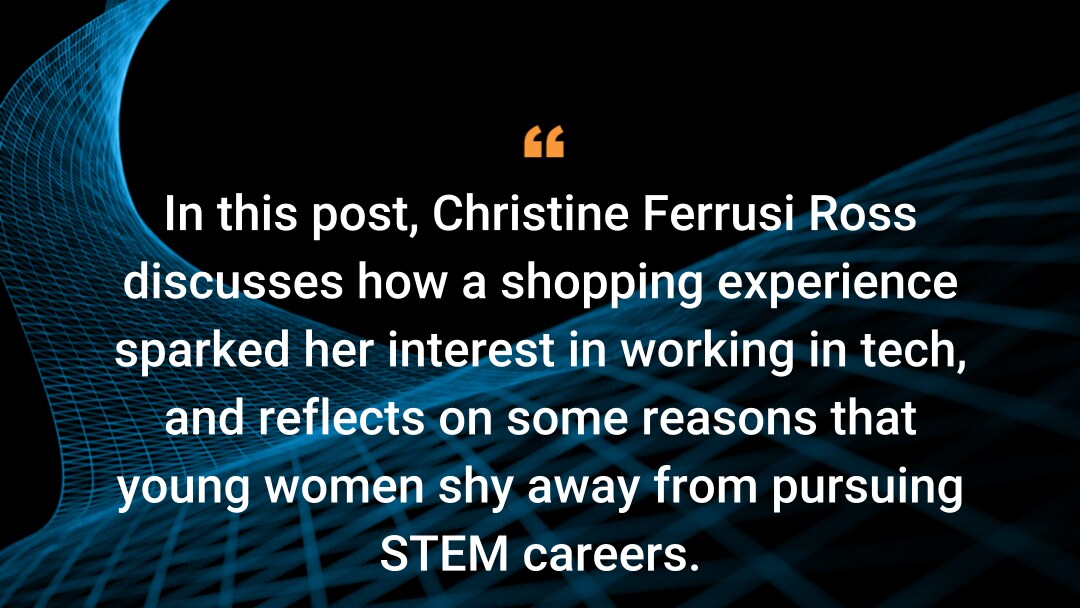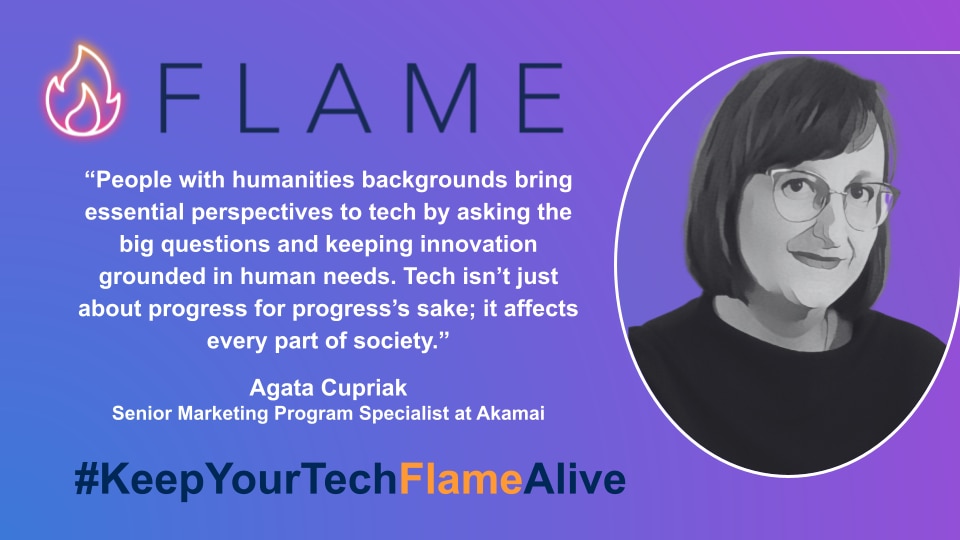How Technology Changes the Landscape of Our Lives

Christine Ferrusi Ross, Director of Product Marketing, is the focus of the latest blog in the Akamai “Women in Tech” blog series. In this post, Christine discusses how a shopping experience sparked her interest in working in tech, and reflects on some reasons that young women shy away from pursuing STEM careers and the importance of having a technical background in her marketing role.
Technological advancements have made a significant impact on our daily lives. From personal computers to smartphones, we’ve seen a transformation in how we work, communicate, and entertain ourselves. These innovations have altered the way we interact with the world and, for many of us — including Christine Ferrusi Ross, Director of Product Marketing for Akamai’s API and Security portfolio — technology has led to major life changes.

In this blog post, Christine discusses how her experience with shopping for a personal computer changed the trajectory of her career aspirations as she entered the world of technology.
The impact of technology and the role it plays in shaping the future
Christine was introduced to tech during her college years; purchasing a PC was a turning point in her life. It made her realize that her initial career path wasn’t aligned with her true interests.
“I wanted a PC to do my college work on,” says Christine, “and in the process of buying a computer and going through all of the technical [questions], such as ‘What kind of chip, what does megahertz mean and how much hard drive space do you need? What are all the different options?’ I [became] enthralled with technology. Shopping for that PC really got me into the tech space. PCs would be the tech that changed my life.”
The process of shopping for a PC sparked a fascination with technology and its endless possibilities. At the time, Christine was pursuing a career in mass communication and international relations.
“I honestly would have gone back and switched to be an engineer or a computer science major, but that wasn't possible. So I leveraged my mass communication degree to go into high-tech PR.”
Christine’s decision led her down a new career path — one that she found was more aligned with her passions. While some aspects of technology weren't always available to Christine, she was drawn to the fundamentals of science, technology, engineering, and math (STEM), — particularly math and science — at an early age.

“I didn't not like technology beforehand. I didn’t not like science,” she explains. “It just didn't occur to me that that's what I would want to do with my career. STEM in general isn't the first thing that girls gravitate toward in late middle school and high school. Earlier on, you see that girls are just as interested in science as boys are. Over time, you see boys get pushed harder into science, and girls are not pushed as hard into the sciences.”
Breaking down stereotypes
The trend of categorizing women into a particular field or industry based solely on their gender is emerging as a concerning practice; such labeling to a single characteristic can undermine a woman’s professional abilities and achievements.
“You hear ‘Women are shy; women don’t put themselves out there or apply for jobs unless they meet 100% of the criteria or full qualifications of the job.’ When in reality, it was only this sort of random yet practical occurrence that led me to tech,” shares Christine.
Conversely, men are often able to navigate their careers without being burdened by such labels. Instead, men are able to focus on acquiring the necessary skills and knowledge related to the industry they work in. This phenomenon is known as the confidence gap.
The confidence gap
This disparity highlights the need for fair and equitable treatment of all individuals based not only on their qualifications, but also on their merit. By recognizing and addressing that there is a confidence gap, individuals and companies can empower more women to enter and excel in industries typically dominated by men.
“On one hand, you want to support other women, but on the other hand, are we spending time talking about the way we come across in a meeting — to the point that we are not in those other meetings where we should be learning about finance or the business itself?” asks Christine.
“As a woman, you really do have unique challenges sometimes, but if we're spending so much time focusing on those challenges, women are actually not learning the core things that they will probably need to be learning to move forward. It's a struggle.”
We power and protect life online. Our responsibility is to really craft collateral and assets that show the market how our products are differentiated, and why those products are the best solution for particular situations."
Making very technical products understandable to a broader audience
In her current position, Christine leads the team responsible for marketing all the products in the application security portfolio, including App & API Protector, Bot Manager, Account Protector, Brand Protector, and Client-Side Protection and Compliance.

“We power and protect life online,” says Christine. “Our responsibility is to really craft collateral and assets that show the market how our products are differentiated, and why those products are the best solution for particular situations.”
Christine’s team creates collateral, crafts messages by explaining what problems these products solve, shows how the products make life better for security professionals, and positions the messages around competitive differentiators.
For Christine, who has always worked in the tech industry and often with startups, marketing is about learning how to “dig in and understand” what “technical” people are saying and simplify it to bring a unique marketing perspective to the assets she creates.
I told our chief data scientist at Akamai that I decided to study computer science so I could understand our bot data better, which he thinks is hilarious."
Mastering technical domains
Marketing for a cybersecurity company requires a nuanced understanding of different industries and domains. When it comes to tackling complex and technical areas like security, Christine has been able to bring valuable insight to her role.
“For me, security is a super important domain. It changes a lot, it's complicated. And I like that because if it's complicated, it needs somebody to make it simpler. I tend to look for things like that to work on, where I could add something special because of my skills,” says Christine.
Everyone has to pay their dues
In the tech industry, it is often acknowledged that individuals must pay their dues to be successful in their career. Women who entered the field during its inception may have encountered fewer inclusive experiences than those working in tech today. In terms of career advancements, and being included in critical meetings, experience rather than age, gender, or educational background may be a more crucial factor in determining inclusion today.
“When I was younger, there were guys in my space who were taken a little more seriously and got ahead faster than my female peers at the time. But I would say [at that time], I was just paying my dues because I was young. I thought ‘I'm still working my way up.’”

As you age, your outlook can evolve. “As I got older, into my thirties, I was like, ‘Oh, now it’s clearer that the person who got the promotion wasn’t as senior as me. It’s not paying dues anymore, now I can see what’s about biases and other factors.’ But I’ve also had some wonderful bosses and opportunities that I’m very grateful for, so I feel really satisfied with my career path.
And I’ve been very happy in the tech space. I've never felt like I don't belong in a meeting or that I shouldn't be here. Maybe I just got along with all the engineers, therefore, I wasn't that different from them.”
You can't assume that people will know what you're interested in. It's my job to put myself out there."
Start where you are
Making a transition in your career may involve pivoting from what you initially thought you wanted to do and what opportunities are available to you. Career pivoting involves learning new skills and building a network, and may require obtaining additional education or training. Receiving guidance on career paths or educational aspirations, or having someone recommend you for a position, can impact how your career is cultivated.
“I have been very lucky to have people who were willing to tell me things, and willing to help me out with things,” says Christine. “Not in the formal way that people talk about mentors. I think I've just been lucky to work with great people over the years who have taught me different things that I was able to carry forward or pick up different skills as I was moving along.”
Be willing to take a risk with your next career move
When considering a new industry or job promotion, it is natural to feel apprehensive about taking a risk. But taking a chance may lead to opportunities that can elevate your career growth. After being immersed in the tech field, Christine decided to take her career to the next level and is currently studying to become a computer scientist. “I told our chief data scientist at Akamai that I decided to study computer science so I could understand our bot data better, which he thinks is hilarious.”
Advocate for yourself
Although having a mentor can be beneficial when navigating a new career path, mentorship is not the only way to help advance your career. It is essential to advocate for yourself and make your career goals and interests known to others. Even if you have a mentor, you can't always rely on them to do all the work for you.
“Mentors are useful, but not everybody has access to mentors,” says Christine. “There are a lot of things that mentors can do for you: Your mentor can tell you what the right conferences are to go to, or they can introduce you to people. Mentorship reduces the time and energy you put in the wrong path versus helping you stay on the right one. But you don’t need them to be successful. There are a lot of things that you could do on your own. It might take you a little longer … [and] there's a lot of trial and error.
“You can't assume that people will know what you're interested in,” says Christine. “The best advice I got is that I cannot expect people to know that I want to get promoted … or that I want to move to a different department … or that I happen to know a lot about a particular topic: blockchain, PCs, bot management, whatever. It's my job to put myself out there.”
Heed the tenets of the growth mindset
Christine is a big fan of the growth mindset, which is based on the belief that talents and abilities can be developed and enhanced through effort and persistence.
“The biggest take away is to be willing to accept that just because [something] is hard doesn't mean you're not good at it. You can be good at something and it can still be hard,” notes Christine. “The growth mindset says, ‘I can eventually learn this.’ The old mindset says, ‘I'm not good at this,’ and then [you] stop. The growth mindset can be very powerful if you really implemented it.
“We think that because it's hard, maybe there's something wrong. ‘It comes easier to other people, so it's not right for me.’ You have to get rid of the idea that if it was hard, it means you're not good at it. You have to bite the bullet and say it is hard and I am good at it. You may be crying while you're doing your homework, but do your homework and then you'll be a computer scientist (at least in my case).”
If you don't include a lot of people from a lot of different backgrounds, not just by culture, but also by socioeconomic status, then you may very easily build a system that is cutting out a part of the population unintentionally.
How the tech industry can become more inclusive: stop gatekeeping
Gatekeeping can be done intentionally or unintentionally, and often results in excluding people who may not fit the predetermined (and sometimes subconscious) criteria. Gatekeeping comes in many forms, including cultural norms, educational requirements, and economic barriers. These challenges can limit opportunities for professional development, growth, and promotion for women in tech. Christine believes the best way to increase inclusion is to stop gatekeeping.
“For example, when I decided early last year that I was going to get my degree, I found out that there are only two schools in New England that offer a part-time bachelor’s in computer science. Why is it that we keep telling everybody they should go into tech, but then we don't have more part–time computer science programs? We don't make it easy for people who don’t already have a lot of resources available to them, like the financial ability to go to school full time,” explains Christine. “That's all gatekeeping that I think that we could change.”
Using technology to impact change
Technology has undoubtedly transformed Christine’s career, and she has used it as a powerful tool to achieve personal and professional growth. By actively seeking different opportunities, diverse perspectives, and varied life experiences, individuals can become catalysts for change and can propel diversity, equity, and inclusion in the tech industry.
“If you don't include a lot of people from a lot of different backgrounds, not just by culture, but also by socioeconomic status, then you may very easily build a system that is cutting out part of the population unintentionally,” she says. “Changing that kind of mindset would really open up opportunities for a lot of people.”




